The Iconic 1999 UEFA Champions League Final: Manchester United vs. Bayern Munich
On May 26, 1999, the footballing world witnessed a final that would be etched into the annals of history forever. The UEFA Champions League Final held at the Camp Nou in Barcelona was not just another game; it was a dramatic showcase of resilience, tactical prowess, and sheer willpower. This match, which saw Manchester United defeat Bayern Munich 2-1, remains one of the most memorable moments in football history.
The Build-Up: Two Teams, One Dream
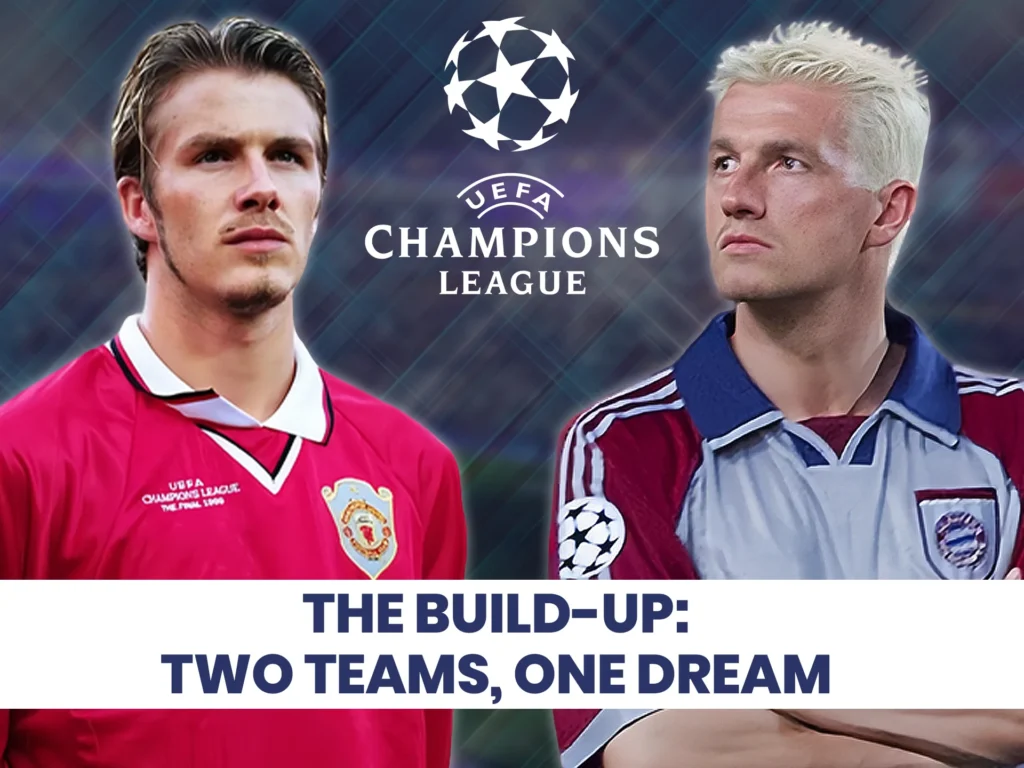
The 1999 UEFA Champions League Final was the culmination of a thrilling season for both Manchester United and Bayern Munich. For United, the season had already been historic. Under the stewardship of Sir Alex Ferguson, the team had clinched the Premier League and the FA Cup, setting the stage for a potentially historic treble. Bayern Munich, on the other hand, had dominated the Bundesliga and was looking to cap off their season with a European title.
Manchester United entered the final without two key midfielders, Roy Keane and Paul Scholes, who were suspended due to yellow card accumulation from the semi-final against Juventus. Their absence forced Ferguson to make tactical adjustments, including moving David Beckham into central midfield and starting Ryan Giggs on the right wing, with the Swedish winger, Jesper Blomqvist, taking Giggs’ usual left flank position.
A Shocking Start: Bayern’s Early Lead
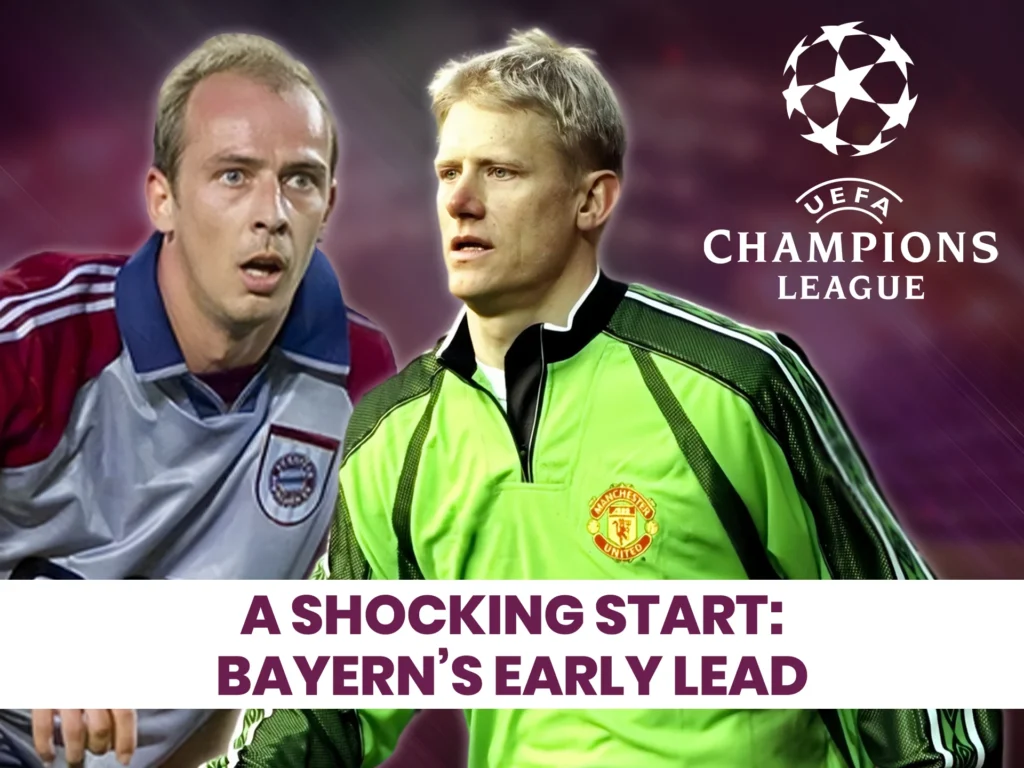
From the very beginning of the match, Bayern Munich demonstrated their intent. The game kicked off with a high tempo, and within just six minutes, Bayern had taken the lead. A beautifully struck free-kick by Mario Basler from the edge of the penalty area found the bottom corner of the net, leaving Manchester United’s goalkeeper, Peter Schmeichel, with no chance. The goal was an early setback for United, who were already feeling the pressure of their key players’ absences.
As the match progressed, Bayern Munich appeared to be in control. They created several opportunities to extend their lead, with Mehmet Scholl hitting the post and Carsten Jancker’s header crashing against the crossbar. Manchester United, meanwhile, struggled to find their rhythm. The absence of Keane and Scholes was palpable, as United’s midfield seemed disjointed and ineffective.
The Final Moments: United’s Unbelievable Comeback
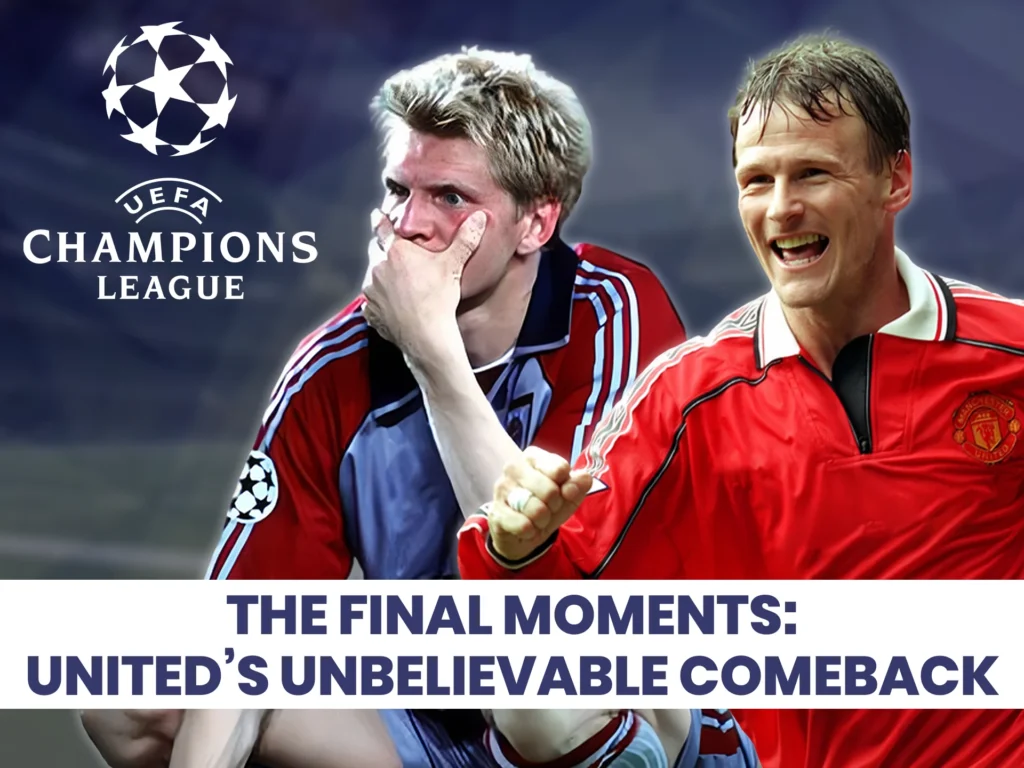
As the game approached its final moments, Bayern Munich looked poised to secure their victory. The 90th minute approached, and UEFA President Lennart Johansson was seen preparing his congratulatory speech for Bayern Munich. It seemed as though the German side’s triumph was inevitable. However, what unfolded in the dying moments of the game would become the stuff of legends.
In a dramatic twist, Manchester United managed to turn the game around in injury time. The key to their comeback was a series of dramatic events that unfolded in quick succession. With just a few minutes left, United won a corner kick, which was taken by David Beckham. The delivery found Teddy Sheringham, who, in a moment of sheer opportunism, managed to bundle the ball into the net, equalizing the score at 1-1.
The stadium erupted in disbelief and jubilation from the Manchester United fans, while Bayern Munich’s players were stunned. The game was far from over. Just two minutes later, another corner kick was awarded to Manchester United. Beckham’s delivery was once again pinpoint, and this time, it was met by the boot of Ole Gunnar Solskjaer, who fired the ball into the net, giving United a 2-1 lead. The turnaround was complete, and Bayern Munich’s hopes were dashed in a manner that was both astonishing and heart-wrenching.
The Aftermath: Celebrations and Reflections
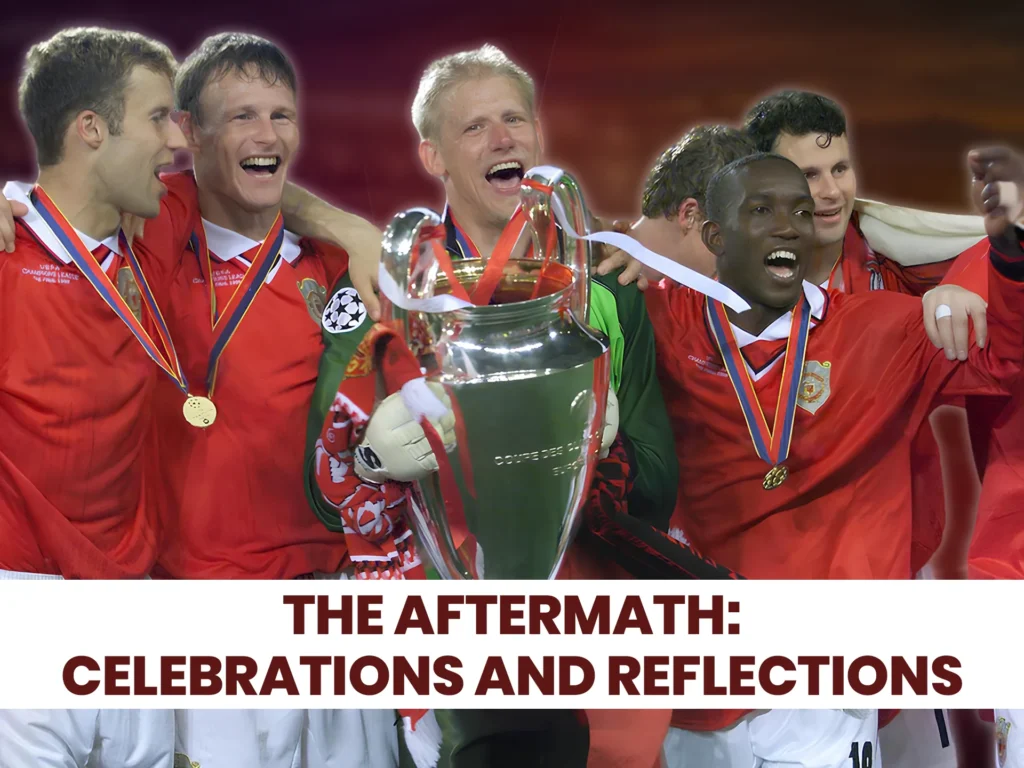
The final whistle blew, and Manchester United had completed an incredible comeback to win the UEFA Champions League. The players, still in disbelief, celebrated on the pitch as Bayern Munich’s players sank to the ground in devastation. The victory secured the treble for Manchester United — a feat that had not been accomplished by any English club before.
In the immediate aftermath of the match, the scenes at Camp Nou were a mix of euphoria and disbelief. The Manchester United players, dressed in their grey Versace suits adorned with the club’s crest, could hardly contain their joy. David Beckham later revealed that he had kept his Champions League winner’s medal around his neck for several days, even sleeping with it. The victory was not just about winning a trophy; it was about achieving something that many had deemed impossible.
Back in Manchester, the team was welcomed with open arms by a sea of fans. Approximately 750,000 supporters gathered to celebrate the historic achievement, transforming the city into a vibrant celebration of football. Sir Alex Ferguson, the mastermind behind United’s success, felt a profound sense of fulfillment. He had always considered winning the Champions League as the ultimate measure of his success as a manager. With this victory, Ferguson had not only secured the treble but had also cemented his place as one of the greatest managers in football history.
Interesting Facts and Trivia
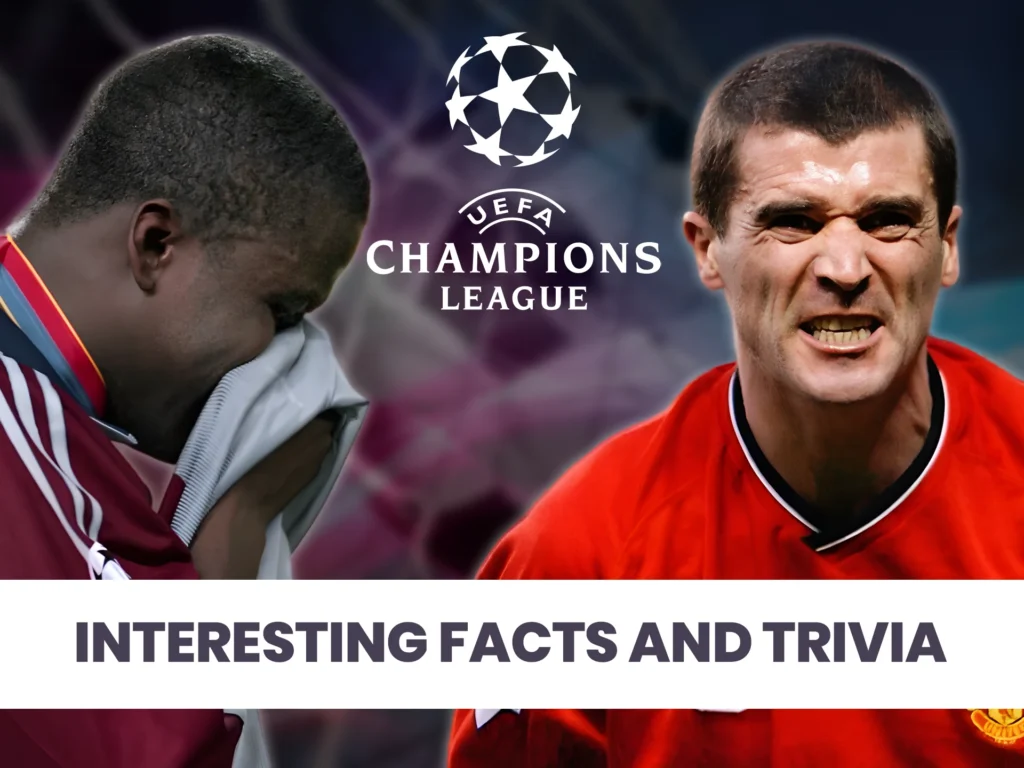
The 1999 Champions League final was not just remarkable for its dramatic conclusion but also for the unique context surrounding it. It was the first final in eight years not involving an Italian club, breaking a pattern that had dominated European football. Additionally, it was the first final in which neither team was the reigning domestic champion — Arsenal had won the Premier League in the 1997/98 season, while Kaiserslautern was the Bundesliga champion in Germany.
Bayern Munich’s starting lineup included just one foreign player, Samuel Kuffour from Ghana. This was indicative of a time when European clubs were still predominantly domestic in their composition. The absence of Roy Keane and Paul Scholes was a significant factor in United’s performance, leading to a tactical reshuffle that ultimately proved pivotal.
Mario Basler’s early goal, with its low xG (expected goals) of just 0.07, was one of the few chances Bayern converted during the match. In contrast, the manner in which Manchester United scored their late goals — through set-pieces — was a testament to their resilience and ability to capitalize on every opportunity.
Legacy of the Match
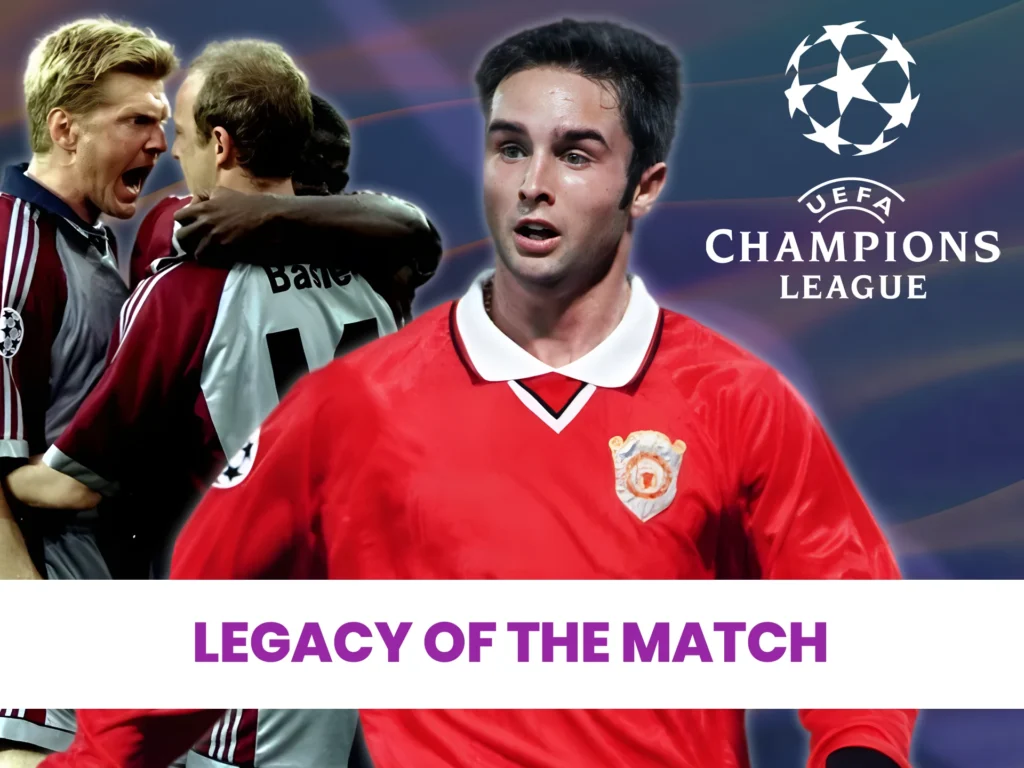
The 1999 UEFA Champions League Final remains a defining moment in football history. It exemplified the drama and unpredictability that make football such a beloved sport. The match highlighted Manchester United’s indomitable spirit and ability to perform under pressure, while also demonstrating the emotional highs and lows that can come with a final.
For Bayern Munich, the defeat was a painful reminder of how fleeting success can be in football. The match has since become a symbol of the unpredictability and drama of the sport, showcasing how games can change in the blink of an eye. For Manchester United, the victory was a crowning achievement that solidified their place in football folklore, ensuring that the 1999 final would be remembered as one of the greatest comebacks in the history of the game.
The final of 1999 was not just a game but a story of passion, perseverance, and the enduring magic of football. It serves as a reminder that in football, as in life, anything is possible until the final whistle blows.
